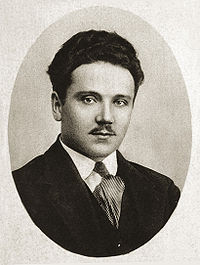
Jonas Vailokaitis
Encyclopedia

Lithuania
Lithuania , officially the Republic of Lithuania is a country in Northern Europe, the biggest of the three Baltic states. It is situated along the southeastern shore of the Baltic Sea, whereby to the west lie Sweden and Denmark...
n politician, banker, and industrialist, and one of the twenty signatories
Signatories of the Act of Independence of Lithuania
The signatories of the Act of Independence of Lithuania were the twenty Lithuanian men who signed the Act of Independence of Lithuania on February 16, 1918. The signatories were elected to the Council of Lithuania by the Vilnius Conference in September 1917 and entrusted with the mission of...
to the Act of Independence of Lithuania
Act of Independence of Lithuania
The Act of Independence of Lithuania or Act of February 16 was signed by the Council of Lithuania on February 16, 1918, proclaiming the restoration of an independent State of Lithuania, governed by democratic principles, with Vilnius as its capital. The Act was signed by all twenty...
.
Born near Šakiai
Šakiai
Šakiai is a city in the Marijampolė County, Lithuania. It is located west of Kaunas. It is presumed that Šakiai first expanded from Šakaičai village. By 1719 a church in Šakiai was built. By the 19th century Šakiai already had city rights; it also had a school, Catholic and Lutheran churches, a...
, he was educated at the Institute of Commerce and Industry in St. Petersburg. Together with his brother he established a bank in Kaunas
Kaunas
Kaunas is the second-largest city in Lithuania and has historically been a leading centre of Lithuanian economic, academic, and cultural life. Kaunas was the biggest city and the center of a powiat in Trakai Voivodeship of the Grand Duchy of Lithuania since 1413. During Russian Empire occupation...
in 1912. They pursued a policy of buying estates from bankrupt owners, subdividing them, and then selling the land to smaller-scale Lithuanian farmers; this was credited with placing these lands out of the reach of Russian colonists. He served in the Vilnius Conference in 1917 and was elected to the Council of Lithuania
Council of Lithuania
The Council of Lithuania , after July 11, 1918 The State Council of Lithuania , was convened at the Vilnius Conference that took place between September 18 and 23, 1917. The council was granted the executive authority of the Lithuanian people and was entrusted to establish an independent...
, signing the act of independence in 1918.
In 1920 Vailokaitis was elected to the Constituent Assembly on the Christian Democratic Party ticket; he served as chairman of the budget and finance commissions. His commercial pursuits included the founding of Ūkio Bankas (The Farmer's Bank), the joint stock trading company Metalas, and several import-export companies.
During the Soviet occupation of Lithuania in 1940, he moved to Germany
Germany
Germany , officially the Federal Republic of Germany , is a federal parliamentary republic in Europe. The country consists of 16 states while the capital and largest city is Berlin. Germany covers an area of 357,021 km2 and has a largely temperate seasonal climate...
, where he died in 1944.

